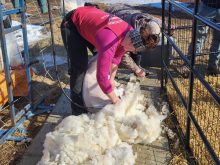The United States Department of Commerce has ruled Canadian cattle producers are not unfairly subsidized.
The ruling has vindicated the industry and saved it from a countervail duty.
“We run a clean act here and being accused of subsidizing our industry was just wrong,” said Ben Thorlakson, president of the Canadian Cattlemen’s Association.
The Oct. 13 countervail ruling said the level of support is too low to be considered a threat to American producers. The subsidy investigation is now terminated.
However, the department upheld a ruling that some Canadian live cattle were sold below the cost of production in 1998. An anti-dumping duty imposed July 1 was raised slightly to an average weighted rate of 5.63 percent.
Read Also

Charges laid after cattle theft
Saskatchewan RCMP lay two charges against a man after six cattle went missing.
The duty is paid by cattle exporters. All duties are held in trust by the U.S. treasury department until a final ruling is made in mid-November on the dumping charges. If the duty is overturned, the exporters get their money back.
Thorlakson does not expect similar investigations into beef exports because the product is handled by packing companies that favor free trade.
The department’s investigations of Canadian trade practices followed petitions filed by the U.S.-based Ranchers-Cattlemen’s Action Legal Fund. The organization blames Canadian imports for an oversupply that drove down prices paid to American cattle producers.
R-CALF may be a one-issue organization that fueled fired based on American beliefs that heavy subsidies exist in Canada, said CCA foreign trade committee chair Neil Jahnke.
Studies show Canadian subsidies are far below what American producers receive.
A recently released study by the George Morris Centre based in Guelph, Ont., said total government transfers of agricultural payments fell from $8.1 billion in 1991 to $4 billion in 1996.
In the countervailing duty petition, R-CALF claimed the Canadian Wheat Board acts as an indirect subsidy to Canadian cattle producers by restricting feed barley exports, which keeps domestic barley prices artificially low.
The board came through the investigation unscathed.
The Net Income Stabilization Account program was also examined and was ruled non-countervailable.
However, the Alberta grazing lease program is considered a producer benefit because some renters receive a payment from energy companies for use of land.
A final ruling on the anti-dumping duty is expected from the American International Trade Commission in November. If the duty becomes permanent, Canada may appeal the decision to the World Trade Organization.
Canada and other beef producing nations want a better definition of dumping that considers the cyclical nature of agriculture production and market prices. This market reality occasionally forces producers to sell below the cost of production, said trade analyst Darcy Willis of Alberta Agriculture.

















